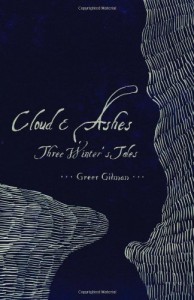 Three tales set in the realm of Cloud, which seems to be a medieval Europe-like world. Ashes is both a mythic figure and someone that women play at being, or become. It's all very interesting, but also difficult to follow. The book will suddenly start referring to "he" after a long section exclusively about women, with no indication of what man or mythic male character is intended. The writing is beautiful, but tangled. For example:
Three tales set in the realm of Cloud, which seems to be a medieval Europe-like world. Ashes is both a mythic figure and someone that women play at being, or become. It's all very interesting, but also difficult to follow. The book will suddenly start referring to "he" after a long section exclusively about women, with no indication of what man or mythic male character is intended. The writing is beautiful, but tangled. For example:They are sisters, stone and thorn tree, dark and light of one moon. Annis, Malykorne. And they are rivals for the hare, his love, his death: each bears him in her lap, as child, as lover and as lyke. They wake his body and he leaps within them, quick and starkening; they bear him light. Turning, they are each the other, childing and devouring: the cauldron and the sickle and the cold bright bow. Each holds, beholds, the other in her glass.
Contains a whooooooole lot of sexual assault, which made me give it up after only about 30 pages. I can only deal with so much!
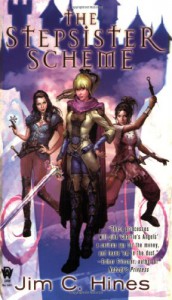 Danielle (known to balladeers as Cinderella) is just settling into her role as a princess when her husband is kidnapped. She, Snow White, and Sleeping Beauty go on a quest to get him back.
Danielle (known to balladeers as Cinderella) is just settling into her role as a princess when her husband is kidnapped. She, Snow White, and Sleeping Beauty go on a quest to get him back.Much of the fairy tale stuff felt a bit too familiar (Cinderella unsure of herself as a princess instead of a servant; Sleeping Beauty being woken with labor pains instead of a kiss, etc), but Hines clearly really enjoys fairy tales, and his interest in the story carried me forward. I think my favorite part of this story was the descriptions of the fairies and their lands.
 In the underground city of Caribe in the near-future, Mayla is in the midst of tense financial negotiations. Her insurance agency requires her to have a bodyguard, so she hires David Dai, a former French soldier with an injured knee and a veiled case of PTSD. After terrorists approach David for help and then make an attempt on Mayla's life, David vanishes into Caribe's underworld. Mayla soon follows.
In the underground city of Caribe in the near-future, Mayla is in the midst of tense financial negotiations. Her insurance agency requires her to have a bodyguard, so she hires David Dai, a former French soldier with an injured knee and a veiled case of PTSD. After terrorists approach David for help and then make an attempt on Mayla's life, David vanishes into Caribe's underworld. Mayla soon follows.Starts wonderfully, but peters out into mind-numbing quotidian detail and plots that the main characters are affected by but don't understand. I wished the characters' emotions were a little less tamped down; even though it felt believable, it also made it hard to care about what happened to them. Still, an excellent and almost too-realistic rendering of alienation and the tension of living in a corrupt society with unspoken, unclear rules.
 Chrysoberl is an artist just barely making her rent when she receives word: the medical experiment she volunteered for is ready for her. To her surprise, instead of a new drug she gets an entire race of microbial people who live inside her brain, patrol her body for ill-health, and worship her as a god. She and the microbial people enter into a tentative detente--she will feed them arsenic and give them light, and they won't turn her into a slave using their ability to manipulate her sensations of pain and pleasure.
Chrysoberl is an artist just barely making her rent when she receives word: the medical experiment she volunteered for is ready for her. To her surprise, instead of a new drug she gets an entire race of microbial people who live inside her brain, patrol her body for ill-health, and worship her as a god. She and the microbial people enter into a tentative detente--she will feed them arsenic and give them light, and they won't turn her into a slave using their ability to manipulate her sensations of pain and pleasure. This is the fourth and possibly last book in Slonczewski's acclaimed Elysium cycle, a series that spans a number of worlds and hundreds of years, yet never lost its personal touch. Like all of the books, the main character has personal problems and concerns, yet is still involved in a much larger social change or revolution taking place. And like the others, this book features a unique mix of hard sf (Slonczewski is fantastic at using biochem to create realistic aliens and future tech without ever infodumping) with a thoughtful exploration of morality.
 A slightly futuristic dystopic twist on [b:The Scarlet Letter|12296|The Scarlet Letter|Nathaniel Hawthorne|http://d202m5krfqbpi5.cloudfront.net/books/1327879100s/12296.jpg|4925227]. The ending felt a little unsatisfying, but this is overall a gripping tale.
A slightly futuristic dystopic twist on [b:The Scarlet Letter|12296|The Scarlet Letter|Nathaniel Hawthorne|http://d202m5krfqbpi5.cloudfront.net/books/1327879100s/12296.jpg|4925227]. The ending felt a little unsatisfying, but this is overall a gripping tale.
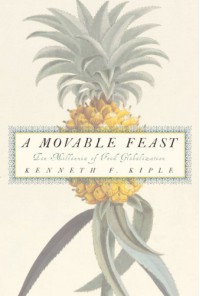 A history of the animals, plants, and processes that make up our food, from the dawn of civilization into modernity. There's some interesting information in here, but it's hidden in what are basically lists. This book is exactly as exciting as an encyclopedia. Now, when I was younger I confess to voluntarily reading encyclopedias from cover to cover (though I never got past the first N volume), but that was for lack of other reading material. Once in a while, a spark of a thesis glimmered, but it was smothered under piles of facts. Still, Kiple's basic points stand up to his yawn-inducing style: the development of agriculture was good for the survival of the human species but bad for our health; GMOs are the bestest; politics, wars, and borders are inextricably linked with foodstuffs.
A history of the animals, plants, and processes that make up our food, from the dawn of civilization into modernity. There's some interesting information in here, but it's hidden in what are basically lists. This book is exactly as exciting as an encyclopedia. Now, when I was younger I confess to voluntarily reading encyclopedias from cover to cover (though I never got past the first N volume), but that was for lack of other reading material. Once in a while, a spark of a thesis glimmered, but it was smothered under piles of facts. Still, Kiple's basic points stand up to his yawn-inducing style: the development of agriculture was good for the survival of the human species but bad for our health; GMOs are the bestest; politics, wars, and borders are inextricably linked with foodstuffs.
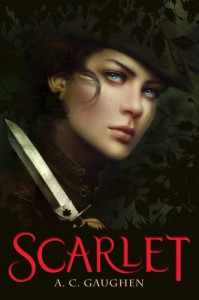 After Robin Hood caught her trying to steal from him, he blackmailed Scarlet (known to the legends as Will Scarlet) into working for his cause against the rapacious Sheriff of Nottingham. With her help, he, Much, and John Little are able to keep the peasants alive. But then the Sheriff starts taking hostages and Scarlet's old foe Guy of Gisbourne, the thieftaker, arrives in Nottingham. With the stakes raised so high, can--
After Robin Hood caught her trying to steal from him, he blackmailed Scarlet (known to the legends as Will Scarlet) into working for his cause against the rapacious Sheriff of Nottingham. With her help, he, Much, and John Little are able to keep the peasants alive. But then the Sheriff starts taking hostages and Scarlet's old foe Guy of Gisbourne, the thieftaker, arrives in Nottingham. With the stakes raised so high, can--Who am I kidding? The author doesn't give a crap about the peasants, who exist purely to make Scarlet feel guilty and alternately praise her as a saint and look down at her as a thief (purely depending on whether the narrative wants the ever-watching Robin to esteem her or pity her). Gaughen doesn't give a crap about the sheriff, either, who has about two lines and is taken care of offhandedly. It's not even about Robin Hood and his quest for justice for his people and himself; Robin's highest concern is always Scarlet. (This is not to say that Robin actually cares for Scarlet, since he spends most of the book moodily glaring at anyone who looks at her, and the last bit of the book calling her a whore after finding out her father promised her hand to someone at age 13.) The only focus of this book is Scarlet. Scarlet has such bad self-esteem that she literally only eats a bite or two of bread every few days, and yet somehow she has the strength to punch guardsmen unconscious, vault over walls, and swing through the trees. Scarlet has eyes like moonstones, and everyone who sees them thinks they're magic and remembers her forever. Every good guy that knows Scarlet is a girl wants to date her, and every bad guy that knows Scarlet is a girl wants to rape her (even in the middle of a pitched battle!). She is very, very special, and just in case the reader ever forgets, the narrative is always there to help her sacrifice herself or get hurt so all the Merry Men stroke her wounds.
I hated Scarlet, and I hated [b:Scarlet|12296|The Scarlet Letter|Nathaniel Hawthorne|http://d202m5krfqbpi5.cloudfront.net/books/1327879100s/12296.jpg|4925227]. This is wish-fulfillment martyr-ish drek of the worst sort.
 1
1
 Evie is a would-be flapper with too much spunk and too little common sense. After exposing a boy's shameful secret at a party, Evie is exiled to New York City to stay with her uncle. The city has all the booze and parties that she'd hoped for, but it also contains a terrible mystery: a serial killer is stalking the streets, and only Evie and her uncle can find and stop him.
Evie is a would-be flapper with too much spunk and too little common sense. After exposing a boy's shameful secret at a party, Evie is exiled to New York City to stay with her uncle. The city has all the booze and parties that she'd hoped for, but it also contains a terrible mystery: a serial killer is stalking the streets, and only Evie and her uncle can find and stop him. I do really like Evie, who never thinks ahead but whose intemperate actions are often more effective than any plan. That said, I don't like that she's become involved with Jericho, who her best friend has been in love with for years. Thou shalt not move in on your friend's crush, especially if your friend is continually sacrificing her own interests for yours. This is the first instance in which Evie seemed not just thoughtless but outright selfish, and it soured the end for me. The other thing that soured the ending for me was that there WAS NO FUCKING ENDING. After slogging through five hundred goddamn pages of minor characters infodumping their sadsack backstories in lieu of plot development, the serial killer is stopped. Huzzah! Except then there are about six more chapters to go, each containing yet another mystical portent that This is Just the Beginning, and that Something Worse is Coming. Well I don't give a crap. The pacing in this book was so incredibly terrible that even though I liked the characters and Bray's Jazz Age, I will not torture myself with more of this series.
 Hannish MacGreagor inherited an impoverished Scottish dukedom. Instead of living an idle life in debt, he moved to America and made a fortune in Colorado silver mines. Now a wealthy man, he has asked his family to move to America as well. To his consternation, only his sister arrives--his wife stopped in New York to shop. Increasingly disturbing rumors reach him, from her cruelty to their servants to her adultery. At last, the infamous duchess comes to Colorado.
Hannish MacGreagor inherited an impoverished Scottish dukedom. Instead of living an idle life in debt, he moved to America and made a fortune in Colorado silver mines. Now a wealthy man, he has asked his family to move to America as well. To his consternation, only his sister arrives--his wife stopped in New York to shop. Increasingly disturbing rumors reach him, from her cruelty to their servants to her adultery. At last, the infamous duchess comes to Colorado. It was at this point that I was surprised. Estranged couples in historical romances tend to fall in love with each other. I'd assumed that the rumors were all misunderstandings, or that the duchess was playing some long game. In fact, she is even more awful than Hannish's servants let slip. He sends her packing back to Scotland, then mopes around his large marble mansion because he's fallen in love with one of his maids but he's against divorce. This was the other unexpected aspect of the book: Hannish and his romance take up a tiny number of pages. Most of the attention is on random other characters the author seems to assume the reader already knows and likes. There's more detail in what each servant packs in their picnic baskets than there is on the romance.
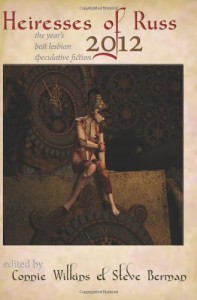 Lesbian speculative fiction, most of it very good.
Lesbian speculative fiction, most of it very good. My favorites:
"To Follow the Waves" by Amal El-Mohtar. Hessa is a dream-crafter, but when someone commissions her to create a dream of the sea, she is at a loss. She doesn't like the sea, or salt water, or beaches. Her art at a stand-still, Hessa goes to a cafe for a break--and there sees a woman so desirable that Hessa is truly inspired for the first time. Beautifully told, with an emotionally complex plot. I've never read anything like it.
"Ours is the Prettiest," by Nalo Hopkinson, is a wonderful mixture of urban and fairy, set in Bordertown.
"D is for Delicious," by Steve Berman is the tale of one school nurse's struggle between starvation and eating children. It's delightfully macabre.
"God in the Sky" by An Awomoyela. A new and unexplained astronomical phenomenon appears, and an astronomer tries to work out what to think. Thoughtful without being preachy or clear-cut.
My least favorite:
"Feedback" by Lindy Cameron is hackneyed old-school cyberpunk. Nothing feels believable, the main character has basically no personality beyond "would-be noir," and the writing is clunky and hard to follow, with more than its fair share of imaginary "futuristic" slang.
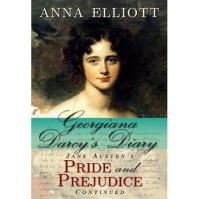 After her brother's marriage, Georgiana Darcy begins to spend more time in Society. Among the contenders for her hand are several fortune-hunters and a man seeking a marriage of convenience--but not the man she's loved all her life. He is engaged to another. To distract herself, Georgiana spends more time with her sickly cousin Anne and with the cottagers on her brother's estate; these interests not only help others, but draw Georgiana out of herself even more.
After her brother's marriage, Georgiana Darcy begins to spend more time in Society. Among the contenders for her hand are several fortune-hunters and a man seeking a marriage of convenience--but not the man she's loved all her life. He is engaged to another. To distract herself, Georgiana spends more time with her sickly cousin Anne and with the cottagers on her brother's estate; these interests not only help others, but draw Georgiana out of herself even more.A sweet, slow-paced tale. Nothing particularly new happens in this story, but it also stayed pretty true to the existing characters, unlike a deplorable number of other Austen-spin-offs. I wasn't caught up, however, and feel no real urge to read further into this series.
 This is a treatise on the importance of individual freedom, both as an end in itself and as the best means of economic development. It is based on a series of lectures Sen gave in 1996-7, which netted him a Nobel Prize in Economic Science. Nearly two decades later, all of his points seem obvious, but I bet they were revolutionary at the time. His writing is an odd mixture of turgid institutional-ese with occasional hilarious sarcastic asides or brilliantly lucid and forthright sentences. Here's an example of the prose you get upon opening this book: "[To base our choices on reason] we need an appropriate evaluative framework; we also need institutions that work to promote our goals and valuational commitments, and furthermore we need behavioral norms and reasoning that allow us to achieve what we try to achieve."
This is a treatise on the importance of individual freedom, both as an end in itself and as the best means of economic development. It is based on a series of lectures Sen gave in 1996-7, which netted him a Nobel Prize in Economic Science. Nearly two decades later, all of his points seem obvious, but I bet they were revolutionary at the time. His writing is an odd mixture of turgid institutional-ese with occasional hilarious sarcastic asides or brilliantly lucid and forthright sentences. Here's an example of the prose you get upon opening this book: "[To base our choices on reason] we need an appropriate evaluative framework; we also need institutions that work to promote our goals and valuational commitments, and furthermore we need behavioral norms and reasoning that allow us to achieve what we try to achieve."Sen credits the "fast economic progress" of East Asian and Southeast Asian economies to social reforms; he claims that in addition to social reforms having positive economic consequences, "lack of social development can quite severely hold up the reach of economic development." He references studies done in India which showed increased economic growth and overall life expectancy and decreased infant mortality and fertility rate after initiatives to improve female literacy and out-of-the-home employment. Additionally, contrasting states within India, or India vs China, show that providing agency and education to women is more effective at reducing fertility and infant mortality than coercive birth control methods. All of this is a delight to read--it's like being told one can have one's cake and eat it too.
Increased freedom and individual agency also prevents some disasters. Sen notes that expending less than 3% of the GNP, or 4-5% of national food consumption, will end a famine, so long as the arrangements are made "in good time." They can be prevented entirely through countervailing government expenditure, particularly in (temporary) job creation. He goes on to say that "Famines are, in fact, so easy to prevent that it is amazing that they are allowed to occur at all. The sens of distance between the ruler and the ruled--between 'us' and 'them'--is a crucial feature of famines."
By far my least favorite section was entitled "Social Choice and Individual Behavior," which consists of dismantling several strawmen (It is impossible to rationally derive social choices from individual preferences! All actions have unintended consequences, so trying to do good will lead to evil, while self-interested behavior will lead to good unintended results!) and a tangled mess of Adam Smith quotes to prove that capitalism does too have ethics. Basically, Sen claims that because capitalism requires mutual trust and norms in order to function, institutional structures and common behavioral codes are created and maintained. This in turn means "the developing countries have to pay attention not only to the virtues of prudential behavior, but also to the role of complementary values, such as the making and sustaining of trust, avoiding the temptations of pervasive corruption, and making assurance a workable substitute for punitive legal enforcement." Personally, I don't understand what makes capitalism so special in this regard--people have to trust each other and set up methods by which they can keep each other in check for *any* system to work. But Sen seems convinced.
The basic message I took away from this was that instead of measuring development through gains in output, income, or consumption, we should focus on how decisions are made within the society, and what opportunities and freedoms people have. Even if development organizations are only concerned with economic growth, they should keep in mind that if people lack rights (such as the right to education or reproductive control of one's own body) and freedom, economic growth will be stalled.
 Lord Sherringham is determined to gain access to his Trust, and in order to do so he must marry. After the Beauty he avowed to love turns him down, he proposes to his old childhood playmate, the penniless orphan Hero. Hero has worshiped him all her life, so of course she agrees to marry him. But the newly-weds find that life is not as simple as they'd supposed: Hero is but 16, with no knowledge of society or much of propriety, and Sherry is continually having to explain the (rather nonsensical, arbitrary, or hypocritical) rules by which she must abide.
Lord Sherringham is determined to gain access to his Trust, and in order to do so he must marry. After the Beauty he avowed to love turns him down, he proposes to his old childhood playmate, the penniless orphan Hero. Hero has worshiped him all her life, so of course she agrees to marry him. But the newly-weds find that life is not as simple as they'd supposed: Hero is but 16, with no knowledge of society or much of propriety, and Sherry is continually having to explain the (rather nonsensical, arbitrary, or hypocritical) rules by which she must abide.tbc
 A dreadful accident makes James Norris realize that he needs to start living life. He travels to his childhood playmates' house, planning on rekindling a romance with Virginia. Virginia is away, leaving him in the company of her younger sister Stella. Always before her ill health kept her out of his way, but now James can see how thoughtful and attractive she is. As for Stella, she's been in love with James since childhood.
A dreadful accident makes James Norris realize that he needs to start living life. He travels to his childhood playmates' house, planning on rekindling a romance with Virginia. Virginia is away, leaving him in the company of her younger sister Stella. Always before her ill health kept her out of his way, but now James can see how thoughtful and attractive she is. As for Stella, she's been in love with James since childhood. Quiet short, but Maguire packs a good deal of characterization in and doesn't muddy the story with excess plot or gothic twists. Forgettable but sweet.
 Concert pianist Emily dies, but when she next opens her eyes, she finds herself in Regency England, inhabiting another woman's body. Millicent was self-obsessed and cruel, living only for sensual pleasures and to torment her rich husband. Now Emily has to deal with the consequences of all the damage Millicent has done. She hopes it isn't too late to convince her husband that she really is a changed woman.
Concert pianist Emily dies, but when she next opens her eyes, she finds herself in Regency England, inhabiting another woman's body. Millicent was self-obsessed and cruel, living only for sensual pleasures and to torment her rich husband. Now Emily has to deal with the consequences of all the damage Millicent has done. She hopes it isn't too late to convince her husband that she really is a changed woman.I felt like Emily was a bit too good to be true, particularly in how easily she adjusted to living in the Regency era. Just a comment or two about hygiene differences or the lack of good books to read would have satisfied me, but Emily settles into the past without qualm. I did like how difficult she found winning her husband's confidence--Millicent had already played so many games, and lied so many times, that his wariness was believable. And I liked that after he's convinced that Emily really is inhabiting the body of his wife, that he's concerned that by loving her he's breaking his marriage vows; it added a great deal to his characterization as a man of honor. I wish the story was a bit longer and more drawn out, with a plot beyond just Emily's quest to win Barnaby's trust. Something where her lack of experience with the era was a problem, or her future knowledge was an asset, would have added a lot to this book.


